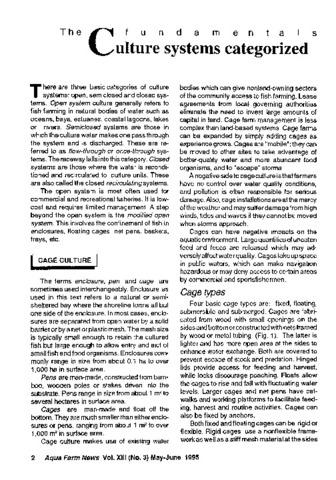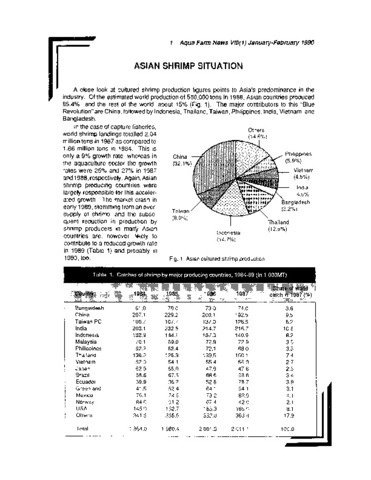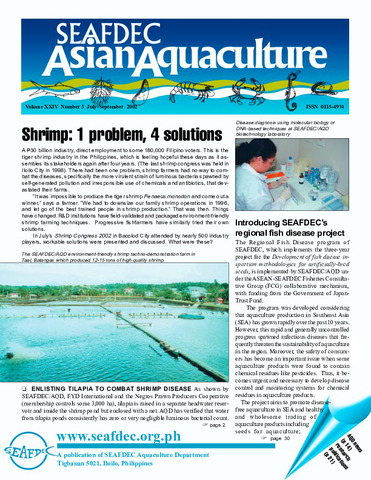On the relationship between aquaculture and food security: Why does aquaculture contribute more in some developing countries than it does in others?
Share
| dc.contributor.author | Drakeford, Benjamin M. | |
| dc.contributor.author | Failler, Pierre | |
| dc.contributor.author | Nunes, Alberto | |
| dc.contributor.author | Hossain, Mostafa AR | |
| dc.contributor.author | Van, Phan Thi | |
| dc.contributor.author | Xinhua, Yuan | |
| dc.contributor.author | Ayson, Felix | |
| dc.contributor.author | Marinda, Pamela | |
| dc.contributor.author | Nyandat, Beatrice | |
| dc.date.accessioned | 2020-10-07T01:00:58Z | |
| dc.date.available | 2020-10-07T01:00:58Z | |
| dc.date.issued | 2020 | |
| dc.identifier.citation | Drakeford, B. M., Failler, P., Nunes, A., Hossain, M. A., Van, P. T., Xinhua, Y., Ayson, F., Marinda, P., & Nyandat, B. (2020). On the relationship between aquaculture and food security: Why does aquaculture contribute more in some developing countries than it does in others? International Journal of Fisheries and Aquatic Studies, 8(4), 12–17. | en |
| dc.identifier.issn | 2394-0506 | |
| dc.identifier.uri | http://hdl.handle.net/10862/6005 | |
| dc.description.abstract | As much as 78% of fish production is subject to international trade competition. While this may be positive for economic growth, it may be at odds with achieving food security. The purpose of this paper is to review the relationship between aquaculture and food security, focussing on trade and markets in some developing countries that account for more than 90% of aquaculture output. The international trade in fish products largely involves the movement of high value species from developing to developed countries and the opposite in reverse, which can contribute to food security. Countries where food security is not improving tend to rely on small-scale aquaculture production of species that are not desired in the main markets, themselves relying on imported fish to meet domestic demand. This suggests that an aquacultural revolution in these countries may contribute to food security, as well as economic growth. | en |
| dc.description.sponsorship | This paper has received funding from the EU 7th Framework Programme Project under grant agreement number 289760. | en |
| dc.language.iso | en | en |
| dc.publisher | AkiNik Publications | en |
| dc.relation.uri | http://www.fisheriesjournal.com/archives/2020/vol8issue4/PartA/8-4-2-671.pdf | en |
| dc.subject | Opportunities | en |
| dc.subject | constraints | en |
| dc.title | On the relationship between aquaculture and food security: Why does aquaculture contribute more in some developing countries than it does in others? | en |
| dc.type | Article | en |
| dc.citation.volume | 8 | |
| dc.citation.issue | 4 | |
| dc.citation.spage | 12 | |
| dc.citation.epage | 17 | |
| dc.citation.journalTitle | International Journal of Fisheries and Aquatic Studies | en |
| dc.subject.asfa | aquaculture | en |
| dc.subject.asfa | developing countries | en |
| dc.subject.asfa | trade | en |
| dc.subject.asfa | food security | en |
| dc.subject.asfa | aquaculture development | en |
| dc.subject.asfa | aquaculture products | en |
| dc.subject.asfa | aquaculture economics | en |
| dc.identifier.essn | 2347-5129 |
Files in this item
| Files | ขนาด | รูป | View |
|---|
รายการนี้ปรากฏใน (s)
-
AQD Journal Articles [1249]
These papers were contributed by AQD staff to various national and international journals



